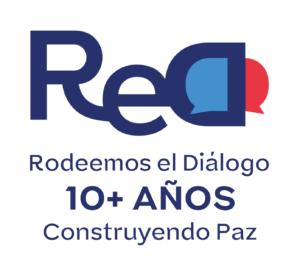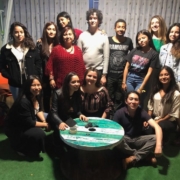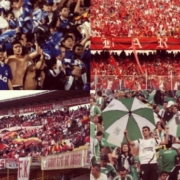Conversatorio 1 de 2017
Guest Speaker: Dr. Cathy Bollaert (University of Ulster)
Topic: Cultural diversity, pluralism, and peace
February 9th
Rodeemos el Diálogo (ReD) were pleased to welcome Cathy Bollaert to their first Conversatorio de Paz of 2017 which took place on February 9th. Cathy, a lecturer at Ulster University and Queens University, Belfast, presented her recently completed PhD research which examined the role of cultural diversity and pluralism on building sustainable peace within South Africa’s transitional process.
Worldviews
In what she termed as ‘worldviews,’ namely the set of core values and assumptions that each culture and person holds as true to them and which influences how we perceive the world, Cathy spoke of how these, alongside other variables such as identity and culture, influence our interpretation of concepts such as peace, reconciliation and accountability. She spoke of the importance of recognising identity as a non-static construct and similarly, that generalised assumptions about culture should not, and cannot be presumed for every person. However when communities lack insight or understanding of other belief systems, division can be reinforced or essentialised along identity lines.
A Western worldview and conception of peacebuilding tends to focus on the importance of the individual, of human rights, of institutional (re)construction and of nation building. A non-Western worldview of peace and reconciliation, conversely, may have a deeper focus on concepts of forgiveness and relationship rebuilding, where values such as respect are highly cherished, and social hierarchy more strongly adhered to. For the Black South African community, for example, the importance of a spiritual connection to ancestors and to ancestral land as well as respect for elders and an emphasis on the shared community has a stronger influence for people than a more Western value system. Cathy’s research found that the extent of cultural difference and diversity was not fully acknowledged in post-Apartheid South Africa. The belief system of the black South African community and the white South African community differed in substantial ways, which were not incorporated or reconciled fully within and during the transitional justice process.
Accommodating diversity
The findings of Cathy’s study suggest that societies in the post-conflict or transitional periods need to create space for all the worldviews and accommodate diversity; that sustainable peace needs to be mindful of the significance and meaning which people place on ideas and concepts such as justice. Hybrid approaches to peace, peacebuilding and transitional justice measures should be contemplated.
Cathy also spoke of the growing movement for a shift in the status quo in South Africa. A movement which appears to be largely youth driven is questioning the transitional process in South Africa and seeking reform of all sectors of society.
What can we apply to Colombia?
The conversation later focused on Colombia and the possible insights which could be leveraged from Cathy’s research as well as from the collective knowledge of all attendees. Additionally, other transitional processes such as the case of Northern Ireland and the concept of negative peace and essentialising discourse were further used to support and contribute to discussion. The group were especially concerned with how to move peace forward in Colombia given its culturally diversity as well as the future of its transitional justice programme. Conversation around diversity looked to the importance of building a national identity to support the transition (and indeed the potential harms that certain forms of stringent national identity can hold); the need for strong leadership both at a national and regional levels, the role of education in peacebuilding, the use of cultural signifiers and symbolism to unite or change behaviour, and of acknowledging difference but also of likeness and parallels.





